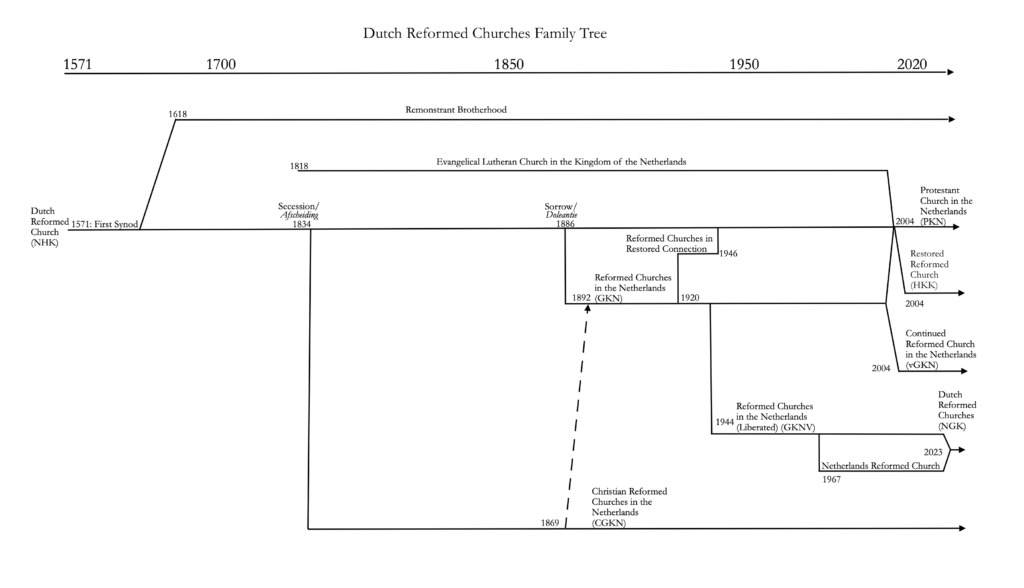Confessional Subscription in the CRC
So it begins: “Historically there have been very few requests for an exception about a specific teaching. But following Synod 2022’s decisions regarding human sexuality, particularly in affirming the confessional status of the church’s traditional understanding of marriage, some Council members have been seeking a process to file an exception, indicating their difficulty with that decision.”
The CRC’s approach to scruples and exceptions, “gravamen”, has differed from the confessional subscription debates in Presbyterianism. No more. Now, at least for the Council of Delegates (denominational executive committee), “When a delegate requests an exception, the Council’s executive committee will make a decision on whether or not to grant it, based on the centrality of the belief for which the exception is sought and the member’s agreement not to publicly contradict, teach, or act against the synodical position.”
The resistance to this recommendation hits all the familiar beats…
One More Time: Evangelicals and Presbyterians
In Ordained Servant, Darryl Hart has a review up of Reformed & Evangelical Across Four Centuries: The Presbyterian Story in America. I wrote about this book back in July, and both used and anticipated Hart’s assessments brought to bear in his review.
One of Hart’s criticisms is that the authors neglect the non-liberal, non-evangelical Presbyterian tradition, with the specific example of ignoring J. Gresham Machen but focusing on Harold Ockenga. I’m sympathetic to this criticism, and count myself as descending from the legacy of Machen. But I suspect that the confessionalist, non-evangelical wing of American Presbyterianism overestimates its importance. The OPC split from the PCUSA in 1936, but by the time the PCUSA merged with the UPCNA in 1958, the mainline denomination had 2.7 million members with the UPCNA having about 257,000. The OPC had about 10,000 in 1958; it’s 32,000 today. Hart cites two other denominations, the ARP and RPCNA, as lacking consideration. The RPCNA had a membership of 6,000 in 1958 and about 7,000 today. I can’t find the 20th century numbers for the ARP, but its current membership is about 22,000.
In other words, the non-liberal, non-evangelical denominations whose story that Hart wished was being acknowledged appear insignificant to the overall history of American Presbyterianism unless you happen to already belong to them…
Spiritual Malaise; Article Up at ‘Mere Orthodoxy’
I have a new article at Mere Orthodoxy. I really wanted to use “weltschmerz“, but it was probably too pretentious. Here’s an excerpt.
Spiritual depression is a melancholy disquiet of the soul, alternating between angst and stupor, that affects the souls of people and nations. A cause that Lloyd-Jones catalogs here is the utilitarian approach to the Christian faith, of valuing Christ’s kingdom as a means to an end. Now, of course no American church or Christian would ever say such a thing. Instead they will talk about the relevance and application of the gospel to their lives: what good is God to me and my interests? This is the way of spiritual depression.
The American church at this moment is in something of a spiritual malaise. This is nothing new; Lloyd-Jones preaching in 1960s London was no stranger to those whose interest in Christianity was focused on its worldview and its applications. There have always been those who view the faith pragmatically and have pressured their leaders and flocks to emphasize the usefulness of the religion. Yet, there is a particularly sharp uptick in the American church of those who see the church’s role as speaking prophetically (that is, mimicking the talking points of political parties with the same level of decorum) to faddish issues and the pressing concerns of that particular congregation’s constituency.
Our debates, discussions, splits and schisms, our tribal identities are being driven by differences over the utility of the gospel.
Click through to read the rest of article.
Why A Weekly Confession of Sin
Modified, from my sent folder in answer to the question “What are your best theological arguments for a weekly confession of sin?”
Pray without ceasing.
And anyone who is opposed to weekly confessing their sins probably needs to be confessing their sins more than that.
I’m assuming that you’re talking about during the Sunday worship service and corporately reciting a prayer together. If that’s the case, I would be unwilling to make the argument that the practice is necessary. However, confessing sin in the worship service is required by scripture.
1. Prayer is required in public worship (cf. WCF 21.3-4). A lot of the argument is going to hang on liturgical hermeneutics. Is prayer as described in the Bible, the New Testament especially, a private or a corporate affair? The Reformed tradition (history is theology) has said that prayer is part of worship and is corporate, not only private. “Our Father…” So when we see prayer prescribed in the New Testament, especially the epistles, it is aimed at the church gathered…

